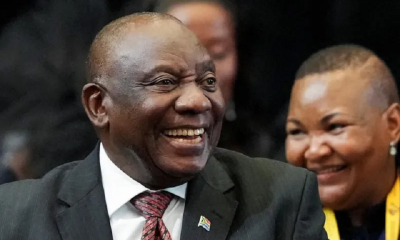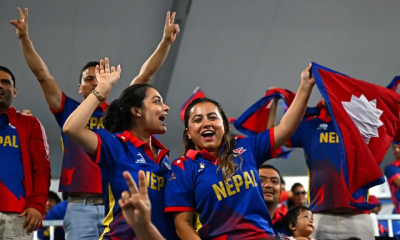News
Sri Lanka is proof that governments use IMF bailouts to hurt political opponents

M Rodwan Abouharb, The Conversation & Bernhard Reinsberg, The Conversation
Sri Lanka received a bailout from the International Monetary Fund in March amid soaring inflation, debt and a sovereign default.In exchange for US$3 billion, the government committed to spending cuts and tax and financial sector reforms. These have prevented Sri Lankan wages from recovering after they fell by almost half in real terms during the preceding financial crisis, leading to protests in the streets of Colombo.
Sri Lankans’ experience of these measures has been far from uniform. Emerging evidence indicates that the government – led by Ranil Wickremesinghe, part of the Buddhist Sinhalese majority – has concentrated the burdens primarily on ethnic minorities, who are the poorest in Sri Lanka and typically support the opposition.
The government has sought to protect the elite, which is primarily Buddhist Sinhalese, by avoiding imposing wealth taxes and only making small increases in corporation tax. It has placed the costs of austerity on low-income people by doubling the value-added tax rate to 15%.
It has also doubled the tax that people pay on pension-fund returns. Again, this hits poor ethnic minorities hardest because they frequently earn too little to pay income tax.
Unfortunately, this experience is part of a worldwide pattern. Our new book, IMF Lending: Partisanship, Punishment and Protest, shows how governments lump the burden of adjustment on opposition supporters while shielding their own backers – in other words, using IMF programmes for political gain.
IMF programmes and past research Scholars have long noted that IMF restructuring programmes create winners and losers, but always in relation to different sectors of the economy. For example, the fact that programmes attempt to strengthen exports has been shown to favour farmers and business owners over urban middle-class state employees like civil servants.
The problem with purely comparing sectors is highlighted when you look at citizens’ experiences. One segment of the survey data we used in our research, covering nine countries in Africa, showed that three out of 10 civil servants actually thought IMF reforms made their lives better, while a similar proportion observed no difference.
Admittedly this data is from 1999-2001, since none of the more recent surveys that we used asked this question, but it raises an important point: if IMF reforms are entirely bad for the civil service, why are so many civil servants upbeat about the effects? Politics is likely to be the missing piece of the puzzle.
An extensive academic literature already shows that governments often use their discretion to play politics over development loans. For example, a recent study found that projects funded by Chinese money are more likely to be undertaken in the birth region of a political leader.
With IMF programmes, it’s commonly assumed that they narrow borrowing governments’ policy options, but that is an oversimplification. Borrowers certainly have less overall freedom over economic policy, but they maintain broad discretion in how they implement loan conditions. Our study is the first to quantify how they use this discretion and examine the consequences for protests within the countries in question.
Our study
We collected individual survey data from over 100 countries from four widely used sources: Afrobarometer, Asian Barometer, Latinobarómetro and the World Values Surveys. It covers a 40-year timespan up to the late 2010s, with periods varying from region to region.
We first examined whether opposition supporters had experiences of reforms different from government supporters. Sure enough, these were indeed more negative.
We worried this might be because these people are more critical of their governments in general. So we compared countries which had just experienced a restructuring programme with others which had not, and found that sentiment among opposition supporters was much more negative in borrower countries.
The graph (above) provides an explanation, showing that opposition supporters in countries on IMF programmes suffer relatively more deprivation than government supporters compared to countries not in programmes.
This “partisan gap” was also wider in countries who went through a more burdensome recent IMF adjustment, which points to the same conclusion.
The effect on protest
We expected that this highly unequal treatment would increase the chances of protest – especially when stoked by opposition politicians. This, too, was robustly supported across the surveys.
In Africa, people who reported being worse off due to the structural adjustment programme were more likely to protest. Opposition supporters as a whole were also more likely to protest, especially if the country had just experienced a more severe IMF programme.
Again, this data was from 1999-2001. Nonetheless, the other surveys also showed that protest was more likely among opposition supporters, especially during times of high pressure for adjustment.
What can be done
Scholars normally blame the increase in inequality caused by IMF programmes on the loan conditions, but the effects are clearly amplified by governments’ policy choices. How could this situation be improved? The IMF could require borrower countries to impose loan conditions in a non-partisan way, but would probably argue that its mandate prohibits considering domestic politics. Policing this would also be very difficult and time-consuming.
An alternative would be for the IMF to tame its demands on borrower countries. This would reduce the burdens that could be inflicted on opposition supporters. Economists might warn that this could encourage countries to be more financially irresponsible. Equally, however, it ought to make it more likely that adjustment programmes will be completed, thereby making the borrowing country more economically resilient for the future. It would also avoid any adverse reaction from the financial markets against a country breaking conditions.
Another potential avenue is to let opposition parties and civil society organisations participate in bailout negotiations. This would ensure everyone “owns” the bailout, and might even make it harder for incumbent governments to exploit policy conditions for political gain.
(M Rodwan Abouharb, Associate Professor in International Relations, UCL. Bernhard Reinsberg, Reader in Politics, University of Glasgow)
News
“We welcome investors and tourists visiting Sri Lanka who contribute to strengthening economic and cultural ties”– PM

Prime Minister Dr. Harini Amarasuriya stated that as Sri Lanka moves towards sustainable growth, the country welcomes investors and tourists who contribute to strengthening economic and cultural ties.
She made these remarks while addressing a special celebration and dinner reception organized by the Sri Lanka India Society to commemorate the 77th Republic Day of India and the 78th Independence Day of Sri Lanka, held on Thursday [February 26] at the Taj Samudra Hotel in Colombo.
During the event, the official magazine of the Sri Lanka India Society was launched, and the book “Port of Call” was presented to the Prime Minister and the Indian High Commissioner.
Addressing the gathering, Prime Minister Dr. Harini Amarasuriya noted that the Sri Lanka India Society since its establishment in 1949 has contributed to strengthening relations between the two nations, through cultural engagement, dialogue, and sustained interaction. The Society has supported ties not only between the two governments but also between the peoples of both countries.
She further stated,
“Over the past year, the strength of India–Sri Lanka bilateral relations has been evident. I express gratitude for the support extended by the Indian government in facilitating the exposition of the sacred Devnimori relics in Sri Lanka.
When Cyclone Dithva affected Sri Lanka, India responded promptly through “Operation Sagar Bandhu,” providing assistance in the rescue and relief efforts.
I appreciated the announcement of a long-term relief package amounting to USD 454 million in support of Sri Lanka’s recovery efforts. India continues to work closely with Sri Lanka in its journey towards sustainable development.
The Sri Lanka–India partnership spans multiple sectors, including economic development, energy, connectivity, trade and investment, digital transformation, health, education, maritime security, and people-to-people ties.
As Sri Lanka progresses towards sustainable growth, we welcome increased investments from Indian businesses and greater tourist arrivals from India, while further strengthening our economic and cultural ties”.
She reaffirmed that India is Sri Lanka’s closest neighbour and an important partner, Sri Lanka is committed to advancing cooperation for the benefit of the people of both countries and the wider region.
Speaking at the event, Indian High Commissioner Santosh Jha stated that the relationship between the two countries goes beyond formal diplomacy and is a strong and special partnership. He noted that the introduction of the first international degree offered outside India in Sri Lanka marked a new chapter in educational cooperation. He also highlighted the continued expansion of collaboration in connectivity and people-to-people relations, adding that India–Sri Lanka relations are experiencing significant growth in the current period.
The event was attended by ambassadors, diplomats, officials of the Indian High Commission, and government representatives.
[Prime Minister’s Media Division]
News
Chief Sanghanayaka of Sabaragamuwa Province felicitated

The “Gauravabhinandana” ceremonial felicitation was held in honour of the Chief Sanghanayake of the Sabaragamuwa Province of the Malwathu Maha Vihara Chapter of the Maha Vihara tradition of the Siyamopali Maha Nikaya; former Pirivena Examiner; Rajakiya Pandith; holder of Master; Scholar of classical texts; recipient of the Kala Bhushana title; Vinaya Keerthi Sri Dhammdinna Saranapala; the Most Venerable Kaeligama Vijithananda Nayaka Thero on Wednesday [25th of February] at the auditorium of the Rathnapura District Secretariat
The event was organized under the patronage of the Anunayake of the Malwathu Chapter of the Siyamopali Maha Nikaya, Most Venerable Acharya Agga Maha Panditha Niyangoda Dharmakeerthi Sri Sangharakkhitha Vijithasiri Abhidhana Anunayake Thero.
The presentation of the symbolic casket to the Most Venerable Kaeligama Vijithananda Nayaka Thero took place with the participation of Prime Minister Dr. Harini Amarasuriya and the Governor of Sabaragamuwa Province, Ms. Champa Janaki Rajaratne.
Addressing the gathering, the Prime Minister stated:
“It is a privilege for me to participate in this felicitation ceremony held in appreciation of the religious and social service rendered by the Chief Sanghanayaka of the Sabaragamuwa Province, Most Venerable Kaeligama Vijithananda Nayaka Thera.
When we reflect on his life journey, it serves as a profound inspiration to us all. Having entered monastic life as a disciple of the Sabaragamuwa prelate, the late Most Venerable Kelle Sri Saranananda Thero, the Nayaka Thera has now rendered over five decades of distinguished service following higher ordination.
After obtaining a Bachelor of Arts degree from the Vidyodaya University, he devoted several decades as a Pirivena teacher and examiner, enlightening thousands of students. He has also authored numerous scholarly works. His classical literary contributions, especially for students of Pirivena education, are of exceptional value”.
The Prime Minister further recalled with gratitude the commitment shown by the Nayaka Thera, centred around the Ratnapura Mahawala Sri Dharmayathana, to uplift the spiritual and social well-being of the local community, and extended her wishes for good health and long life for the continuation of his invaluable service to the Buddha Sasana.
The occasion was also graced by the presence of Most Venerable Karagoda Uyangoda Maithreemurthi Thera, Supreme Mahanayaka of the Sri Lanka Amarapura Maha Sangha Sabha; the Anunayaka of the Sri Lanka Ramanna Maha Nikaya, Waleboda Gnanissara Thera; Lecturer of the University of Peradeniya and Deputy Registrar of the Malwathu Chapter, Panditha Mahawela Dhammakkhanda Rathanapala Thera; the Chief Sanghanayaka of Ratnapura and Uva Wellassa and former Vice-Chancellor of Uva Wellassa University, Bethgamuwa Dhammadinna Thera; along with members of the Maha Sangha. The occasion was also attended by the Minister of Buddhasasana, Religious and Cultural Affairs Sunil Senavi, Governor of Sabaragamuwa Province, Ms. Champa Janaki Rajaratne, Member of Parliament Shantha Padmakumara, former Members of Parliament A. A. Wijethunga and Janaka Wakkumbura, Ratnapura District Secretary Chinthana Udaya Nanayakkara, Basnayake Nilame of the Maha Saman Devalaya Ishan Sanka Mapitigama, Mayor of Ratnapura Indrajith Katugampala, and many other distinguished invitees.



[Prime Minister’s Media Division]
News
Sajith raises fresh concerns over toxic pollutants emanating from burning of substandard coal

Opposition and SJB Leader Sajith Premadasa yesterday raised serious concerns over the Government’s importation of substandard coal, warning that its use has resulted in inefficient electricity generation, increased equipment damage and significant financial losses to the State and consumers.
In a video statement, the Opposition Leader said the SJB had exposed details regarding the importation of inferior-quality coal, prompting what he described as an admission by Government representatives that the coal in question was of poor standard.
Premadasa charged that the continued use of such coal has reduced generation efficiency at the Norochcholai Power Station, while increasing the likelihood of damage to critical equipment.
He further claimed that ash content had risen sharply, from the accepted 11–15 percent range, to over 21 percent, doubling the volume of toxic pollutants generated. The disposal of the excess ash, he said, poses additional environmental risks.
The Opposition Leader also noted that a further 15 to 16 coal shipments are expected to arrive within the next two to three months. However, he alleged that the failure to procure high-quality coal has reduced megawatt output, necessitating greater reliance on fuel-powered plants to bridge the shortfall.
“This results in financial losses to the country, the Government, and, ultimately, to electricity consumers,” he said.
Premadasa cited Section 30 of the Electricity Act of 2009, maintaining that consumer tariffs can only be imposed, based on efficient electricity generation. He urged the Public Utilities Commission of Sri Lanka to safeguard the rights of the country’s 7.5 million electricity consumers, insisting that losses stemming from inefficient generation cannot lawfully be passed on to the public.
He further alleged that the Government’s promised “system change” had, instead, resulted in questionable coal procurement deals. The financial losses incurred through, what he termed, corrupt transactions, he argued, could have been channelled into essential public services, such as education, healthcare, poverty relief and support for entrepreneurs.
Premadasa called not for the appointment of a committee of experts, but for a full forensic audit into the transactions surrounding the coal imports.
He stressed that the SJB would continue to stand in defence of electricity consumers and asserted that the President and Cabinet must accept responsibility for the damage allegedly caused to the Norochcholai power plant, which, he described, as a national asset.
-

 Features6 days ago
Features6 days agoWhy does the state threaten Its people with yet another anti-terror law?
-

 Features6 days ago
Features6 days agoReconciliation, Mood of the Nation and the NPP Government
-

 Features6 days ago
Features6 days agoVictor Melder turns 90: Railwayman and bibliophile extraordinary
-

 Features5 days ago
Features5 days agoLOVEABLE BUT LETHAL: When four-legged stars remind us of a silent killer
-

 Features6 days ago
Features6 days agoVictor, the Friend of the Foreign Press
-

 Business5 days ago
Business5 days agoBathiya & Santhush make a strategic bet on Colombo
-

 Business5 days ago
Business5 days agoSeeing is believing – the silent scale behind SriLankan’s ground operation
-

 Features6 days ago
Features6 days agoBarking up the wrong tree

























